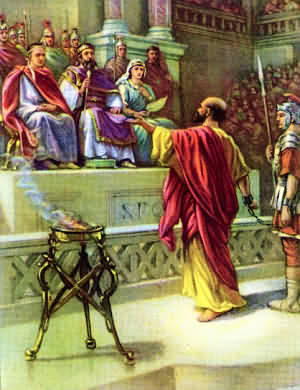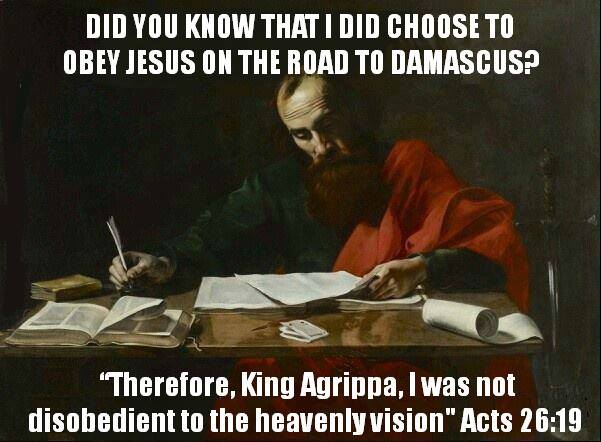Acts 26:29
“King Agrippa, do you believe the Prophets? I know that you do.” Agrippa replied to Paul, “In a short time you will persuade me to become a Christian.” And Paul said, “I would wish to God, that whether in a short or long time, not only you, but also all who hear me this day, might become such as I am, except for these chains.”
Question: Paul wanted conversion from all who heard
him preach that day. But how could that happen, unless
Jesus died for all of them? In other words, how can you
extend a sincere offer of salvation to everyone, or
anyone, if you don’t know whether the offer is any
good?
Answer: If you believe that Jesus died for you, simply
because you believe He died for all, and you fit within
the “all,” then you’d have no problem offering salvation
to all. But imagine if Paul had preached this way instead:
“If anyone here today happens to believe my message,
then he believes only because he has received an
Irresistible Grace in being secretly made Born Again
without even realizing it, and therefore he must be one
of the select few that Jesus died for. So who here
believes? Anyone? No one? Then all of you must have
been eternally passed by.” Is this really, “the Gospel”?
Question: So was Paul speaking from the flesh, or was Paul speaking under the inspiration of the Holy Spirit, reflecting God’s own opinion as well?
Answer: Tough question for a Calvinist. If Calvinists admit that Paul was speaking under the inspiration of the Holy Spirit, then you have a proof-text for Arminianism, on par with 1st Timothy 2:4.
Did Paul mean “all” of the Calvinism’s elect, or “all people everywhere”? Compare with Acts 17:28-31: “...for in Him we live and move and exist, as even some of your own poets have said, ‘For we also are His children.’ Being then the children of God, we ought not to think that the Divine Nature is like gold or silver or stone, an image formed by the art and thought of man. Therefore having overlooked the times of ignorance, God is now declaring to men that all people everywhere should repent, because He has fixed a day in which He will judge the world in righteousness through a Man whom He has appointed, having furnished proof to all men by raising Him from the dead.” Paul didn’t speak out of turn, or from the flesh, but under the inspiration of the Holy Spirit, and therefore Paul’s perspective, is God’s perspective, who moved him to say it.
John Calvin: “If we are not ashamed of the gospel, we must confess what is there plainly declared. God, by His eternal goodwill, which has no cause outside itself, destined those whom He pleased to salvation, rejecting the rest; those whom He dignified by gratuitous adoption He illumined by His Spirit, so that they receive the life offered in Christ, while others voluntarily disbelieve, so that they remain in darkness destitute of the light of faith.” (Concerning the Eternal Predestination of God, p.58, emphasis mine)
How is that “the Gospel”?
John Calvin: “Paul’s reply shows how zealous he was to spread the glory of Christ. He patiently endured the ‘chains’ that the governor had put him in and wished that the governor would escape Satan’s deadly snares and that both he and his colleagues might share in the same grace with Paul.” (Acts: Calvin, The Crossway Classic Commentaries, p.397, emphasis mine)
Paul felt the same way about the Jews. Paul states: “I am telling the truth in Christ, I am not lying, my conscience testifies with me in the Holy Spirit, that I have great sorrow and unceasing grief in my heart. For I could wish that I myself were accursed, separated from Christ for the sake of my brethren, my kinsmen according to the flesh, who are Israelites.” (Romans 9:1-3) “Brethren, my heart’s desire and my prayer to God for them is for their salvation.” (Romans 10:1)
Compare that with Calvinism:
John Calvin: “When God prefers some to others, choosing some and passing others by, the difference does not depend on human dignity or indignity. It is therefore wrong to say that the reprobate are worthy of eternal destruction.” (Concerning the Eternal Predestination of God, pp.120-121, emphasis mine)
John Calvin: “But here he runs full sail against God for determining some from their very creation to destruction.” (Concerning the Eternal Predestination of God, p.78, emphasis mine)
John Calvin: “At this point in particular the flesh rages when it hears that the predestination to death of those who perish is referred to the will of God.” (Calvin’s New Testament Commentaries: Romans and Thessalonians, p.208, emphasis mine)
Question: Do you suppose that when Paul said, “all who hear me this day,” that he really meant “except those that God unconditionally predestined to death, and determined from their very creation to destruction, having passed them by”?
Answer: Paul’s heart does not line up with Calvinism.
John Calvin: “It is no objection that he knew that his salvation was founded on the election of God, which cannot by any means fail. The more passionate emotions plunge impetuously on, without heed or regard for anything but the object on which they are fixed. Paul, therefore, did not add the election of God to his prayer, but put it out of mind, and gave all his attention on the salvation of the Jews.” (Calvin’s New Testament Commentaries: Romans and Thessalonians, p.192, emphasis mine)
Although you may disagree with Calvin’s conclusion, at least he confronted the inconsistency.
John Calvin: “Agrippa meant that he would not be a Christian willingly; indeed he would not be one at all, and yet he could not deny that he was drawn against his will. From this we see how great the pride of human nature is, until it is brought into submission by the Spirit of God.” (Acts: Calvin, The Crossway Classic Commentaries, pp.396-397, emphasis mine)
When Calvin spoke of the pride of Agrippa, it obviously never dawned on him that by embracing Calvinism, he has displayed more pride than Agrippa. Nevertheless, where did that draw come from? Who did the drawing? Recall that Paul himself had resisted the goading of the Holy Spirit, when Jesus stated: “It is hard for you to kick against the goads.” (Acts 26:14) Yet, if Total Inability was true, then we would have to conclude the opposite, in that it is easy to kick against the goads. Nevertheless, according to Calvinism, if Agrippa was not given Irresistible Grace, then here is the true power of the Gospel spoken to him:
John Calvin: “The minister’s teaching and speaking does no good unless God adds his inward calling to it. ... Preaching alone is just a dead letter, and we must beware lest a false imagination, or the semblance of secret illumination, leads us away from the Word on which faith depends.” (Acts: Calvin, The Crossway Classic Commentaries, p.278, emphasis mine)
John Calvin: “Preaching only finds faith in people when God inwardly calls those he has chosen and draws to Christ those who were already his own (John 6:37).” (Acts: Calvin, Crossway Classic Commentaries, p.229, emphasis mine)
John Calvin: “In a word, Paul indicates that all clamorous sounding of the human voice will lack effect, unless the virtue of God works internally in the heart.” (Concerning the Eternal Predestination of God, p.104, emphasis mine)
John Calvin: “Now let Pighius asseverate that God wills all to be saved, when not even the external preaching of the doctrine, which is much inferior to the illumination of the Spirit, is made common to all.” (Concerning the Eternal Predestination of God, p.109, emphasis mine)
According to Calvin, unless Agrippa had been secretly made Born Again, Paul was spinning his wheels. However, in the exchange between the Apostle Paul and King Agrippa, Agrippa confessed that he was brought to the point where he could become a Christian: “King Agrippa, do you believe the Prophets? I know that you do.” Agrippa replied to Paul, “In a short time you will persuade me to become a Christian.” (Acts 26:27-28) The Gospel hit home with Agrippa, which he couldn’t deny: “‘This man is not doing anything worthy of death or imprisonment.’ And Agrippa said to Festus, ‘This man might have been set free if he had not appealed to Caesar.’” (Acts 26:31-32) Agrippa, too, was kicking against the goads. Paul was not preaching a “dead letter.”

